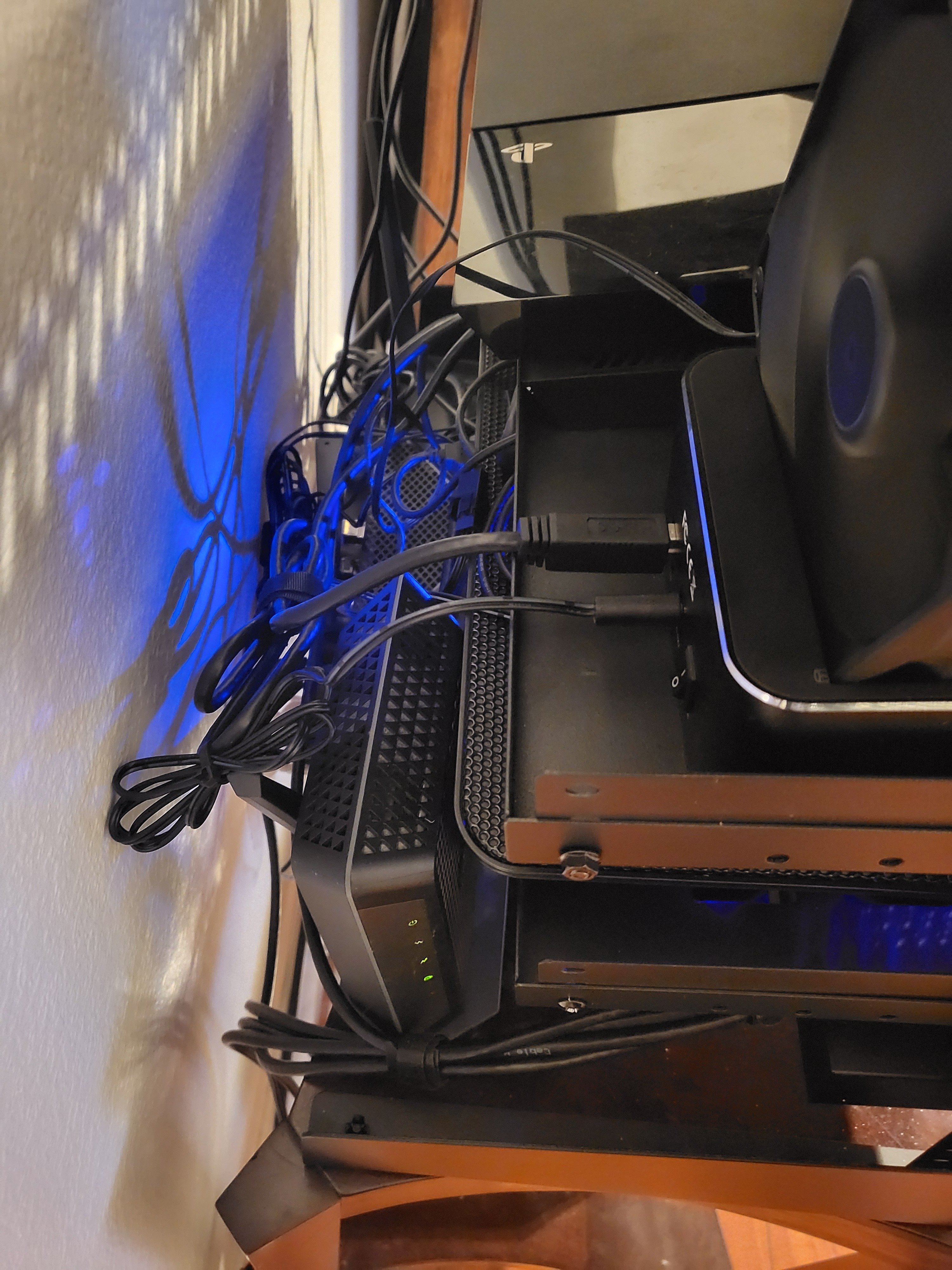
Only use jellyfin. Have a list of things want to update… but it works for now.
Yes that is a laptop usb cooler used as supplemental placebo cooling. Also a pc fan I have propped up against the hard drive feeding into the pi.
Can’t recall last time used the ps4 or switch. But they’re there
I’d rather not. It’s literally a Dell workstation machine from the mid-2000s. It’s like Wolfgang’s Channel kryptonite
I feel like this should be a quarterly post. Really liking all these setups.
Not taking a picture, but here’s what I have:
- Ryzen 1700 in a giant case sitting on my desk (desktop PC is on top of that in a mini-ITX case); 2x 8TB HDDs, connected to network over Wi-Fi; hope to cut the size significantly once one of our ITX boxes need an upgrade (both Ryzen 5600s)
- Mikrotik router (5 port) and Ubiquiti AP sitting next to my bed; Mikrotik handles my local static DNS for my public services
Running:
- Jellyfin, as well as Samba and some other NAS stuff
- HomeAssistant (nothing monitored though, but I plan to add my Sensi thermostat soon)
- Actual Budget
- Nextcloud
- Vaultwarden (currently unused, plan to switch soon)
I also have a VPS to get around CGNAT, and I have a Wireguard VPN configured so communication is encrypted.
Plans:
- upgrade NAS to either a mini-ITX motherboard or a mini-PC w/ external USB-C enclosure
- actually run Ethernet - have been putting off for years
- configure my Sensi thermostat in HA and maybe get some other smart home crap
- use Nextcloud more - want to get SO using the notes app so I can finally kill Google Notes for shared shopping lists
- port my PF spreadsheet to LibreOffice and actually learn to use LO Calc (currently using Google Sheets); I use GoogleFinance func for stock quotes, so I need to replace that with some other workflow (mostly rebalancing investments)
- replace our TV or at least have an alternative for Jellyfin - the config disappears whenever our TV WiFi screws up, which is like 2-3x/month; screw you LG…
So yeah, somewhat simple. My family likes Jellyfin, but I haven’t really gotten them on board with anything else.
Seven Raspberry Pi 4’s and one Pi Zero, mounted on some tile “shelves” inside some IKEA furniture.

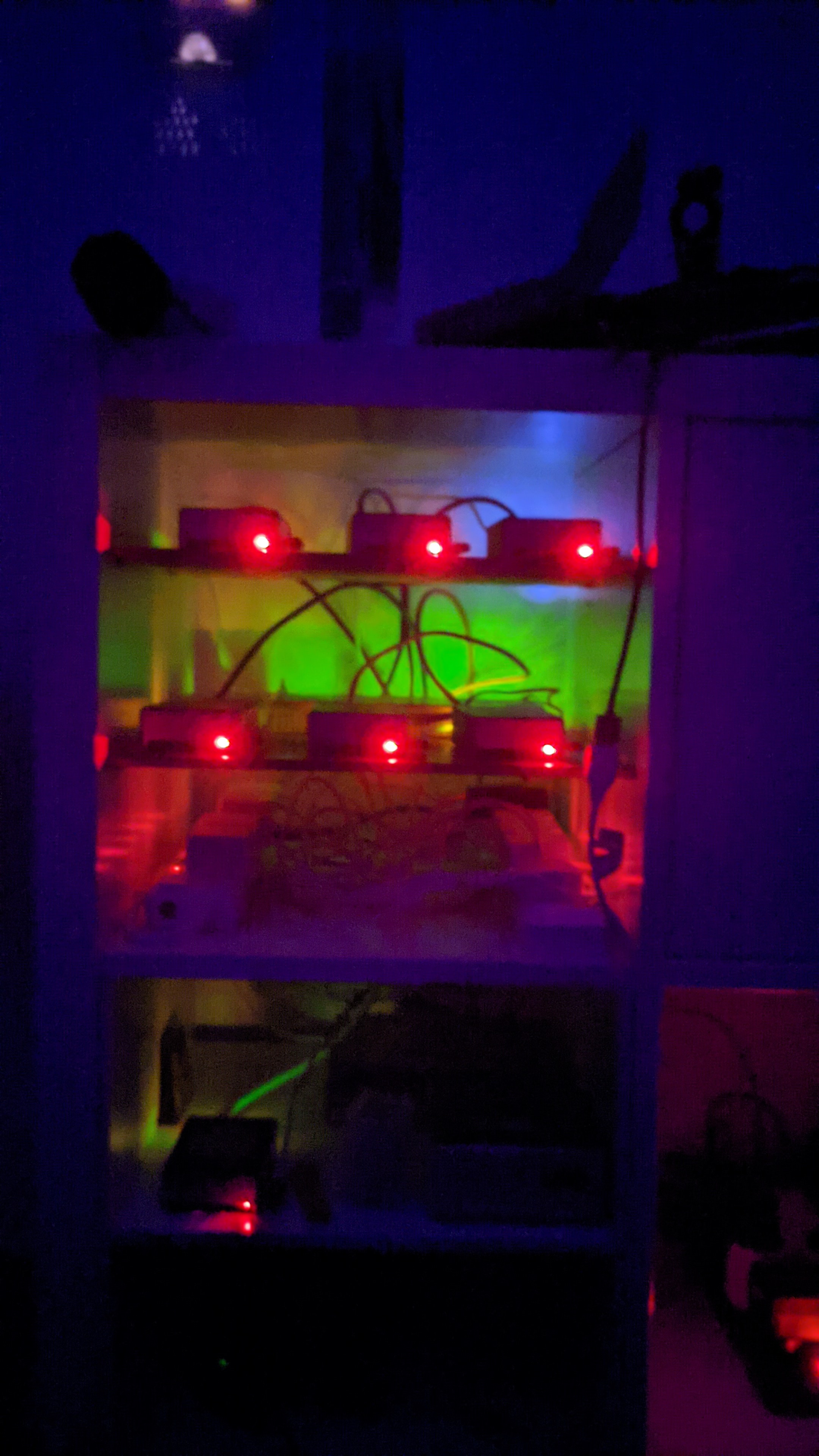

What do you do on that many pi’s that could not be done easier on 1 x86 box?
They’re fanless and low-power, which was the primary draw to going this route. I run a Kubernetes cluster on them, including a few personal websites (Nginx+Python+Django), PostgreSQL, Sonarr, Calibre, SSH (occasionally) and every once in a while, an OpenArena server :-)
I did a 4 node Pi4 kubernetes cluster for about 5 years. The learning experience was priceless. I think most notable was learning to do proper multiarch container builds to support arm and x86_64. That being said, about half a year ago I decided to try condensing it all into two n100 nuc-like clones and keep one pi as the controller. For me and my apps and use cases there was no going back. Performance gains were substantial and in this regard I think I was hobbling myself after the educational aspect plateaued.
Actually, as a web guy, I find the ARM architecture to be more than sufficient. Most of the stuff I build is memory heavy and CPU light, so the Pi is great for this stuff.
Except the Pi doesn’t have much memory.
Each Pi 4 has 8GB of RAM. With six devices, that’s 48GB to play with. More than enough for my needs.
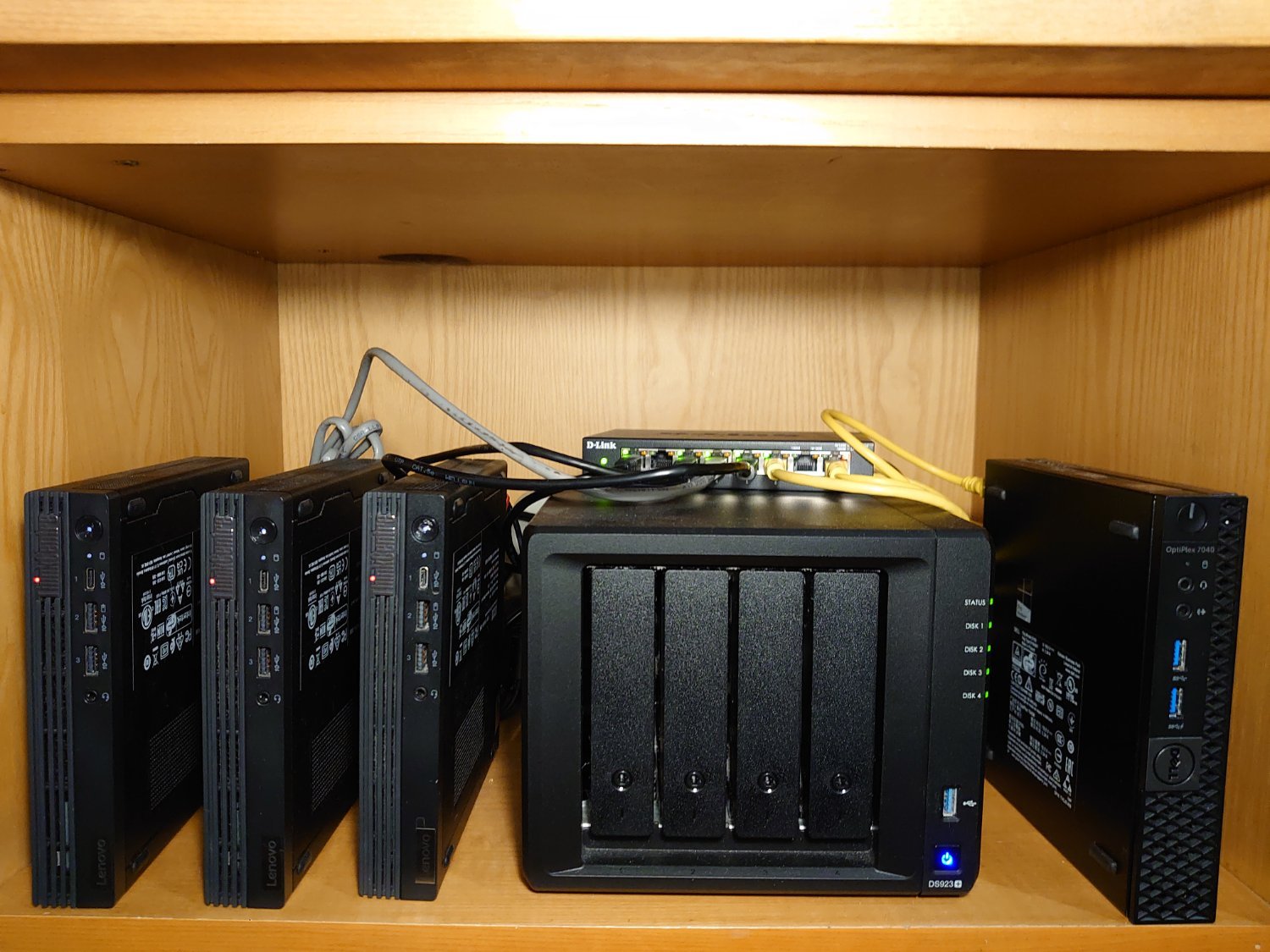
My little cluster
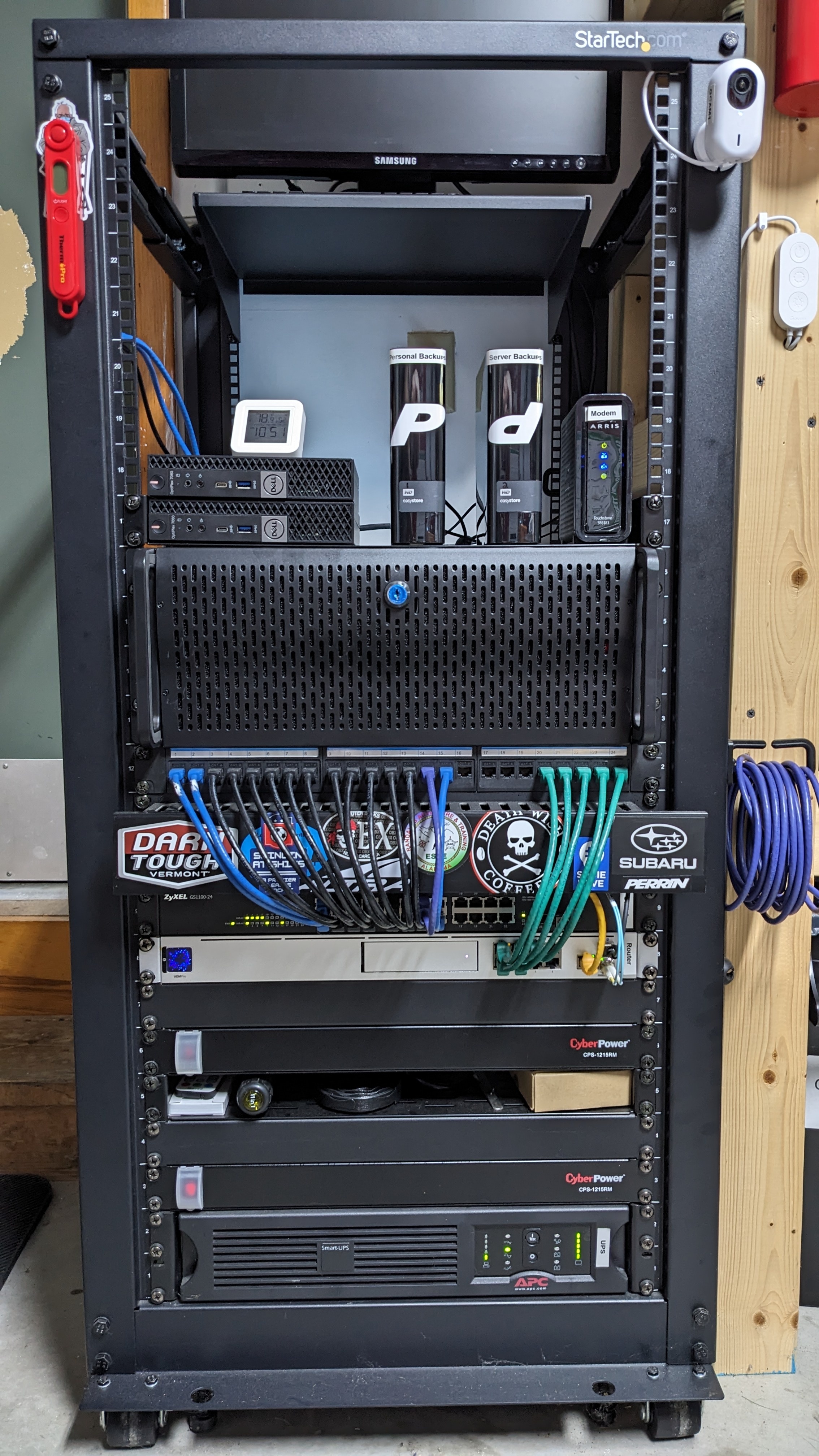
Optiplex gang represent
That’s so weird at first look on this picture I was like: “What’s O…P…D? 🤔” LOL
Cupboard + DiskStation + OptiPlex = Win
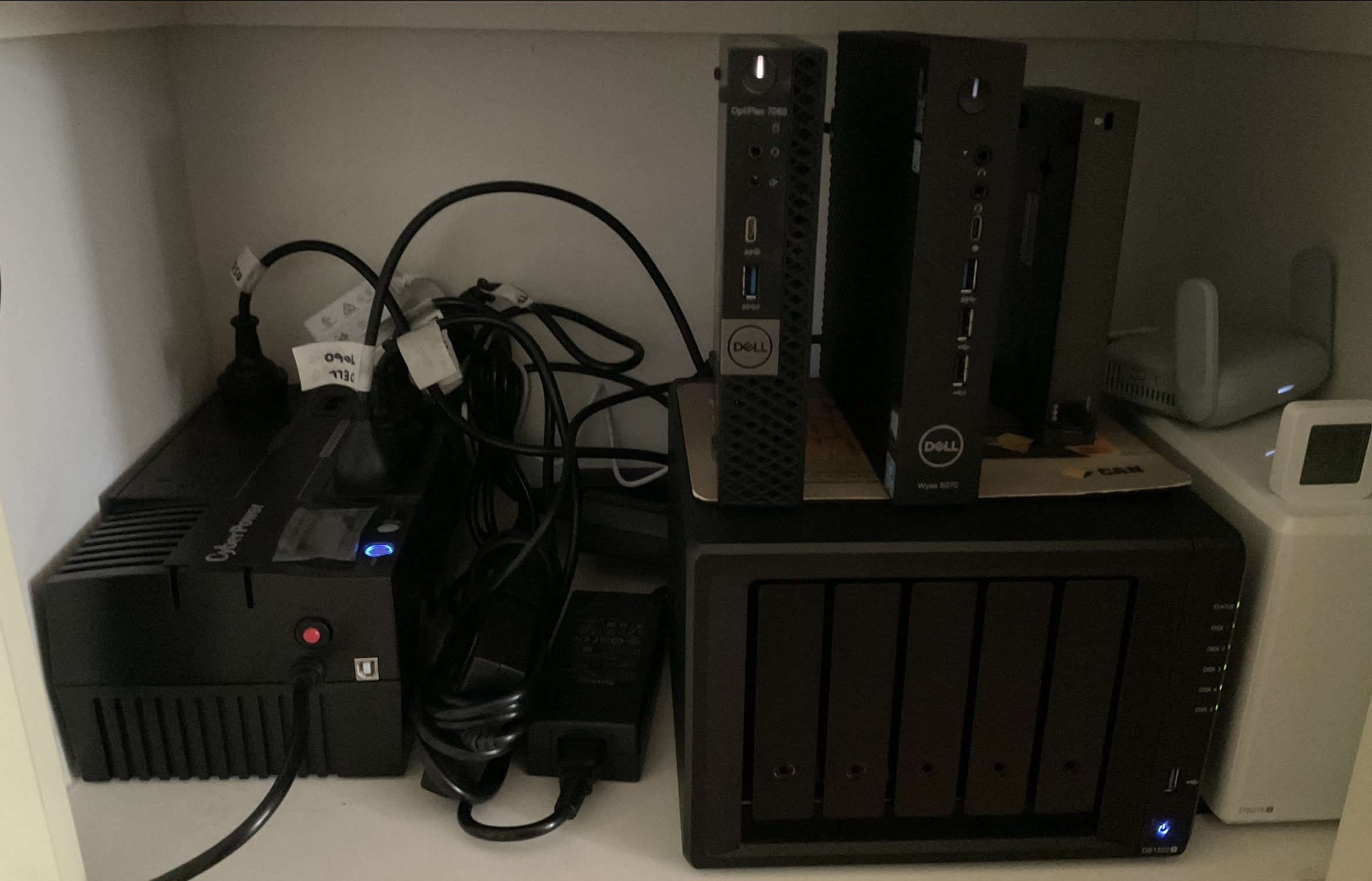
Got the same optiplex to eventually replace the pi.
Nice and clean.
Very easy to find good deals (and parts) on these 1L business PCs!
Mines nothing special, i5 10400 with 16GB of RAM and a 1050ti for video encoding. System runs TrueNAS Scale for Plex and Immich and has 44TB of drives running through a Dell H310 PERC SAS card. I desperately need more storage but I’ve been lacking the funds for new drives, I’d also need a 5.25" drive bay converter to hold the 2 additional drives I need in this case since all the bays are full, and another SAS card since this one’s used up.
I’d like to move to Jellyfin but from what I’ve read it doesn’t do as well for streaming from outside the network compared to Plex and half the users of my server are outside my network. So it works for now.
Also have a Raspberry Pi 5 running PiHole
Also a buddy 3D printed a fan mount for the H310 to make sure it doesnt overheat when doing file transfers and I slapped a Noctua on it

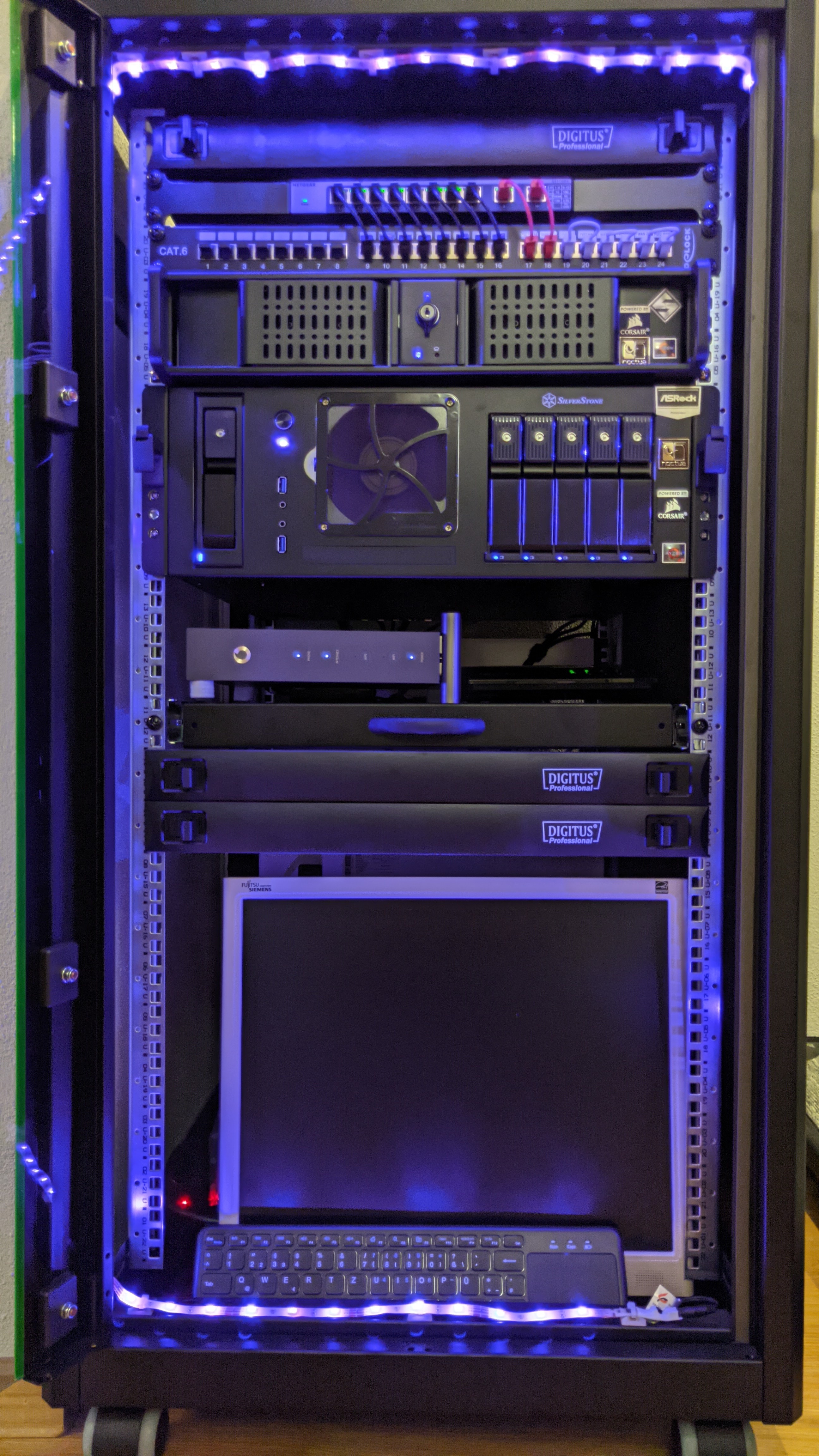
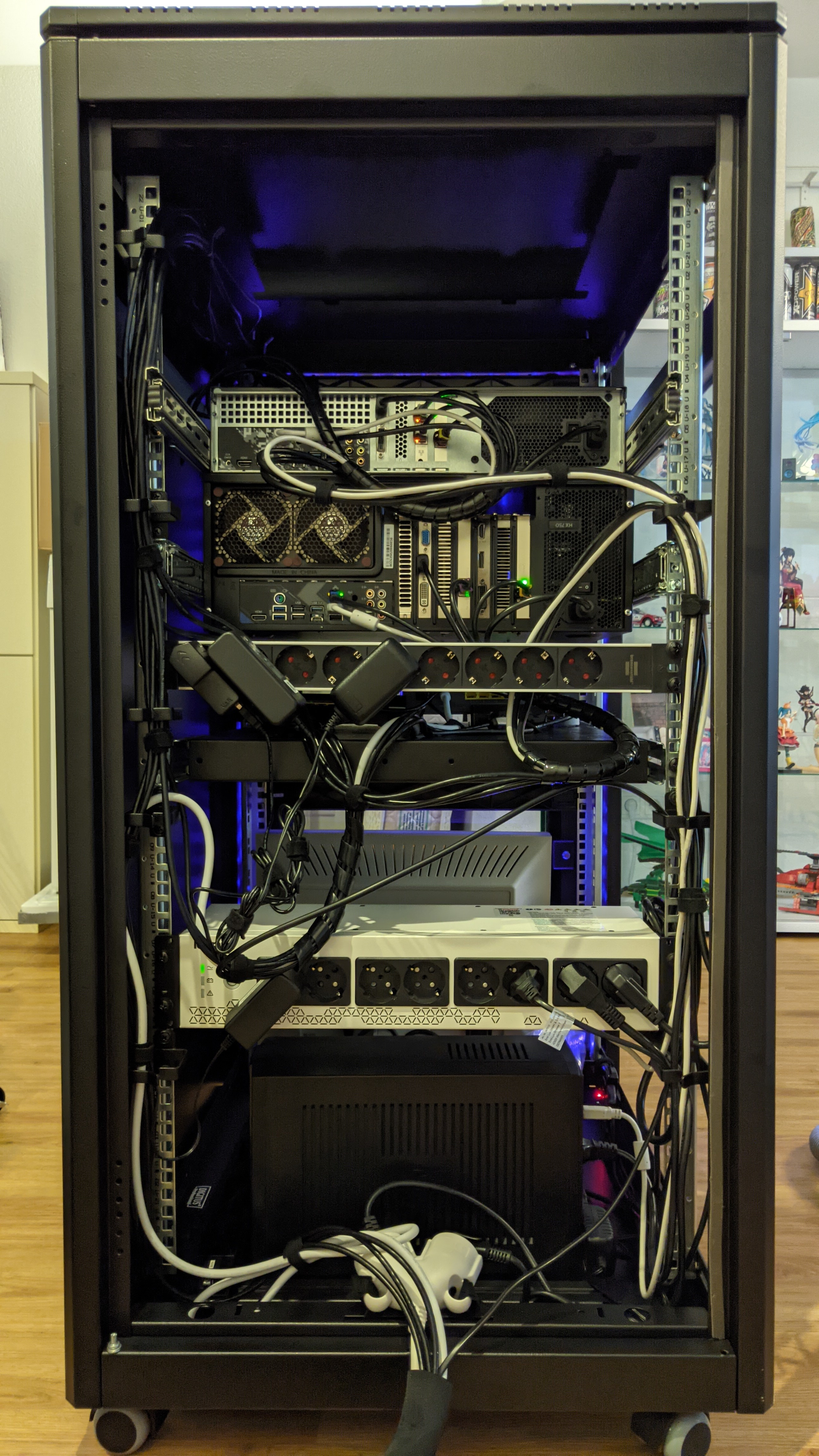
That’s a nice setup. I am weirdly jealous of the sliding shelf. The CS350B is very nice as well.
noice

Rack server on a lack IKEA table.
Nice DJ controller you got there 🤓
Install Linux on both ps4 and switch and selfhost something on them
 An old HP laptop with Debian hosting Klipper and Home Assistant. Waiting for an OTG cable so I could replace the laptop with a phone for less power and heat
An old HP laptop with Debian hosting Klipper and Home Assistant. Waiting for an OTG cable so I could replace the laptop with a phone for less power and heatUsing phones with a continuous power supply might do nasty things to the battery.
Source: I finally figured out how to open a glass back phone with no tools.
For what its worth, some Samsung phones can stop charging while the plug is in, while also not disconnecting anything on a USB dock (such as internet)
Heat, then suction?
On a related note, I solved the battery issue with my wall mounted Fire tablet (for an HA dashboard) by connecting the power supply to a smart plug and setting up an automation to only give it the juice for about 3 hours per day, spread throughout the day
It still amazes me that the smartest phones aren’t yet smart enough to have direct power supply.
Like my 40 year old AM radio.
I’ve done similar with an old Android tablet. Installed Fully Kiosk Browser to display the dashboard AND read the battery level - above 75%, switch off power…
But… automations only trigger when going past the threshold once, so if there’s a random issue where HA doesn’t see the battery drop below 10%, (had that happen a few times in the past), then I also have multiple triggers for 5% and 2%… to turn the power back on again 😉
Yeah, the tablet runs Fully Kiosk and I tried the same thing with the battery percentage thing and ran into the same issue, so I just simplified and made the automation time-based.
The tablet also likes to freeze a few times a day, so I also created an automation that toggles the smart plug power whenever HA loses connection to the tablet for more than 5 seconds, then toggles back to the original state at the start of the automation, which corrects the problem. Until the next time. But hey! It was only $60, so it’s fine.
Wait I see EMT piping for that printer frame… Did you convert an Anet A8 to an “EMT-8” like I did!? :D
Just seemed like a neat coincidence!
The stock A8 was such a scary fire hazard lol.
Yup you’re indeed seeing an EMT8 :D. This thing’s got a SKR mini e3 V3, E3D v6 clone and an E3D titan clone. I have a post about it in my profile.
I bet there are dozens of us EMT8 owners! Dozens!
That’s so cool! Nice work! I feel a certain kinship with anyone who also got tons of 3D printing XP by building, rebuilding, researching, modding, head-scratching, laughing, crying, screaming at an A8 lol.
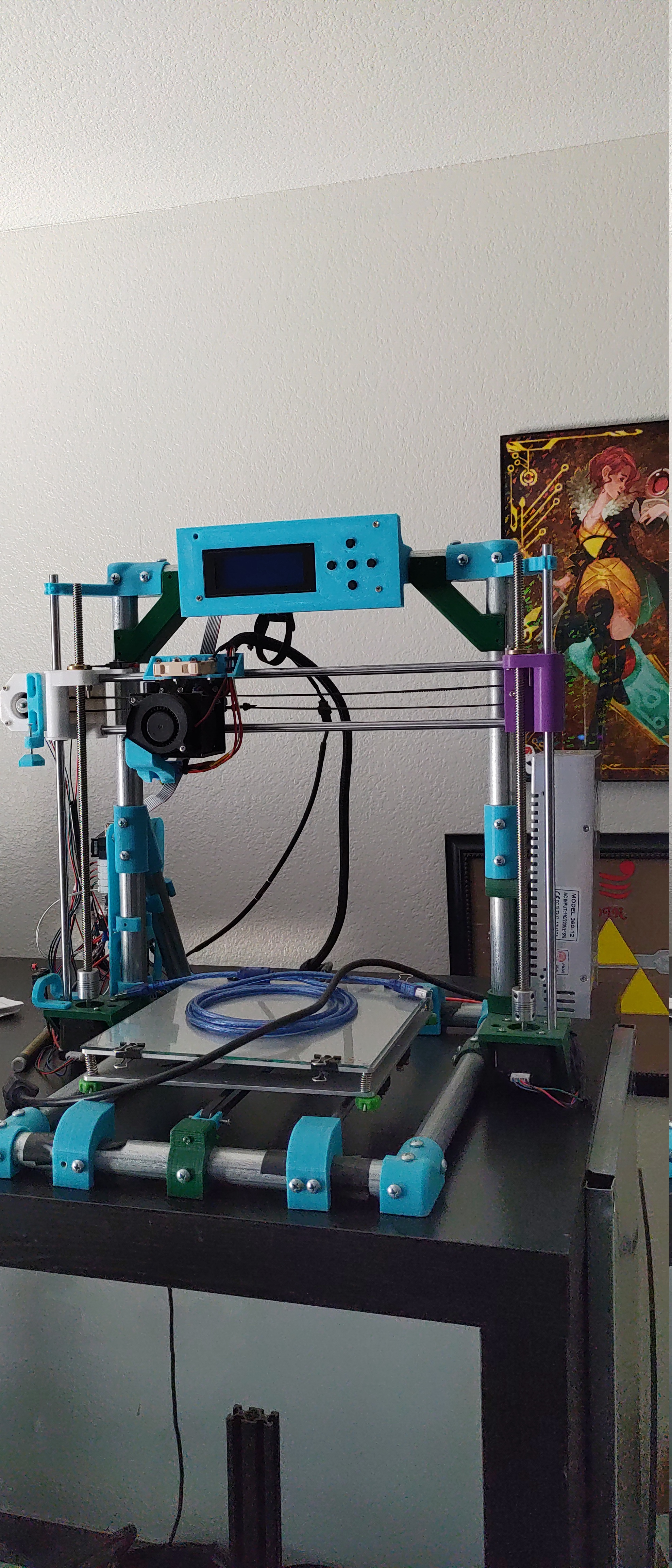
This here is mostly fire prevention: Basically an updated stock motherboard, better PSU, an aftermarket MOSFET board for safety, thicker gauge wires with ferrule crimps for all the power cables, the bed is now attached directly to the thicker wires by way of crimp connectors.
The printing surface is upgraded to carefully cut and polished picture frame float glass. 😂
Added that sweet fan duct mod, a little Noctua 15mm (because it softened and jammed otherwise LOL), and printed that purple bracket at the library because the plastic decided to literally crumble away.
Also the adjustable Z-stop was nice but the PLA softened so it’s a bit unpredictable, and the right motor will gently slip until it’s engaged so the gantry needs to be leveled every time…I also can’t guarantee that the Z rods are straight anymore because it requires such a Goldilocks level of tension I probably overdid it lol.
Oh yeah, I had to replace the main power cable because the one provided just…had a break in it.
It still works for small jobs though! And it printed all those parts for itself, so that’s kinda the RepRap dream right there right??
Lol I feel like an amazing machine is in here somewhere if I bothered to research custom boards and stuff. The stock bearings are also terrible. But if I can bother someday I’ll stick Klipper on it maybe.
It was a crazy, stressful journey…but I learned a ton of electronics stuff, and how to use a multimeter, and engineering stuff! XD
My Ender3V2’s felt like such a crazy luxury by comparison. 😂
Yeah I thought this thing was pretty decent, way better than originally, but then I got to use a Prusa MK4 at school…
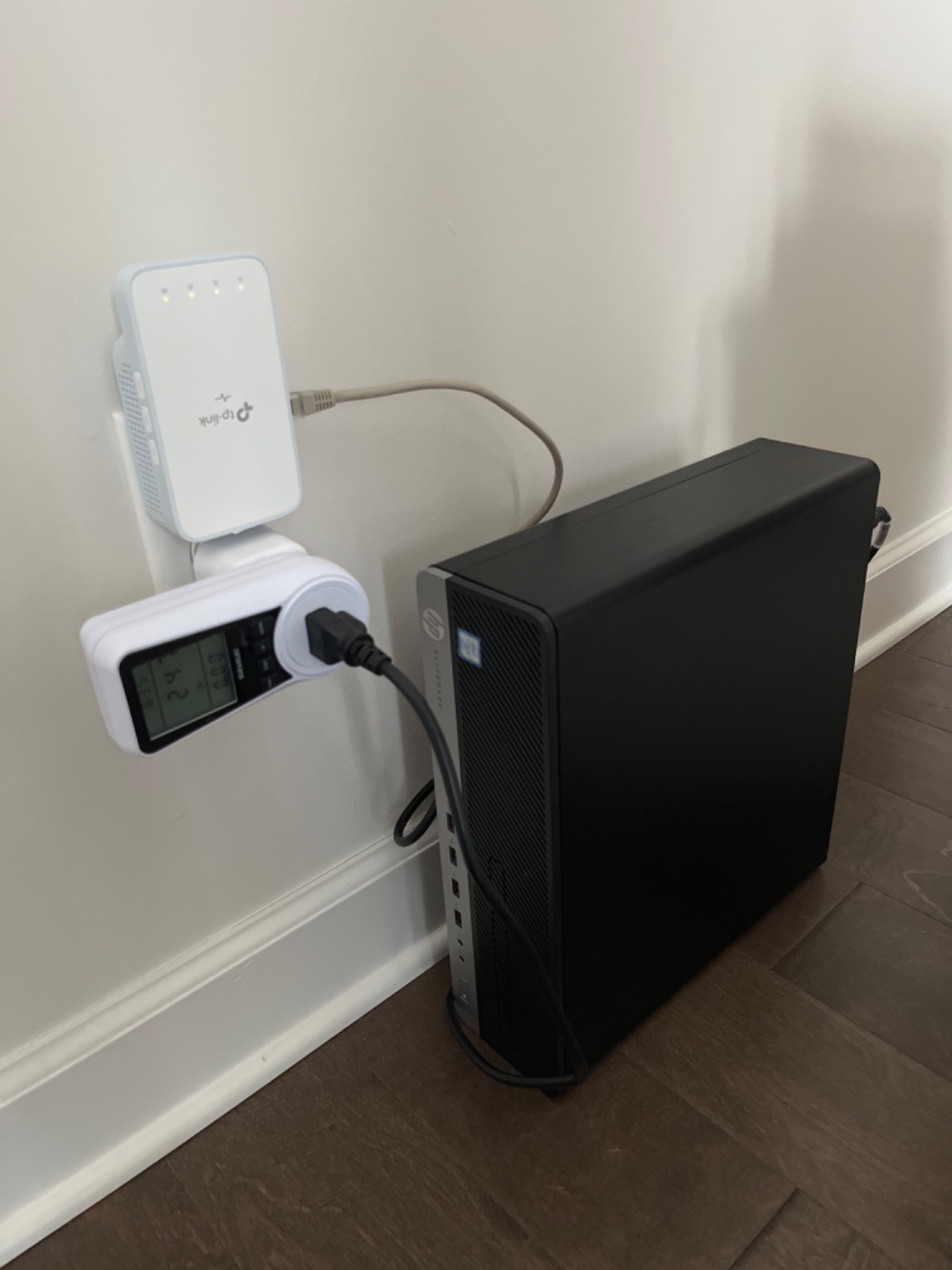
Just a NAS for now. Plan to add PiHole at some point.

Testing an image post from Voyager client…
I only own the gear marked A and B, which lives above the couch I call home.
A is my web services 24/7 Proxmox box, an Intel 8500T; 2 routers; an 8TB HDD; and a Back-UPS Pro so old its ethernet surge protection is rated for 100bT, with a brand new LFP battery in it. The UPS powers both A and B.
B is my personal Proxmox box, an AMD 5750GE, which I use for development and running desktop OSes which I remote into, plus a GL.iNet Slate AX router. These come with me if I stay someplace other than the couch (not pictured). That’s why they’re on different shelves. Also, there’s a USB wifi dongle w/antenna connected to B which I used when some stupid website demands I drop my VPN (all traffic from everything pictured is routed thru 24/7 private VPN endpoints, aka a $2/mo VPS or three).
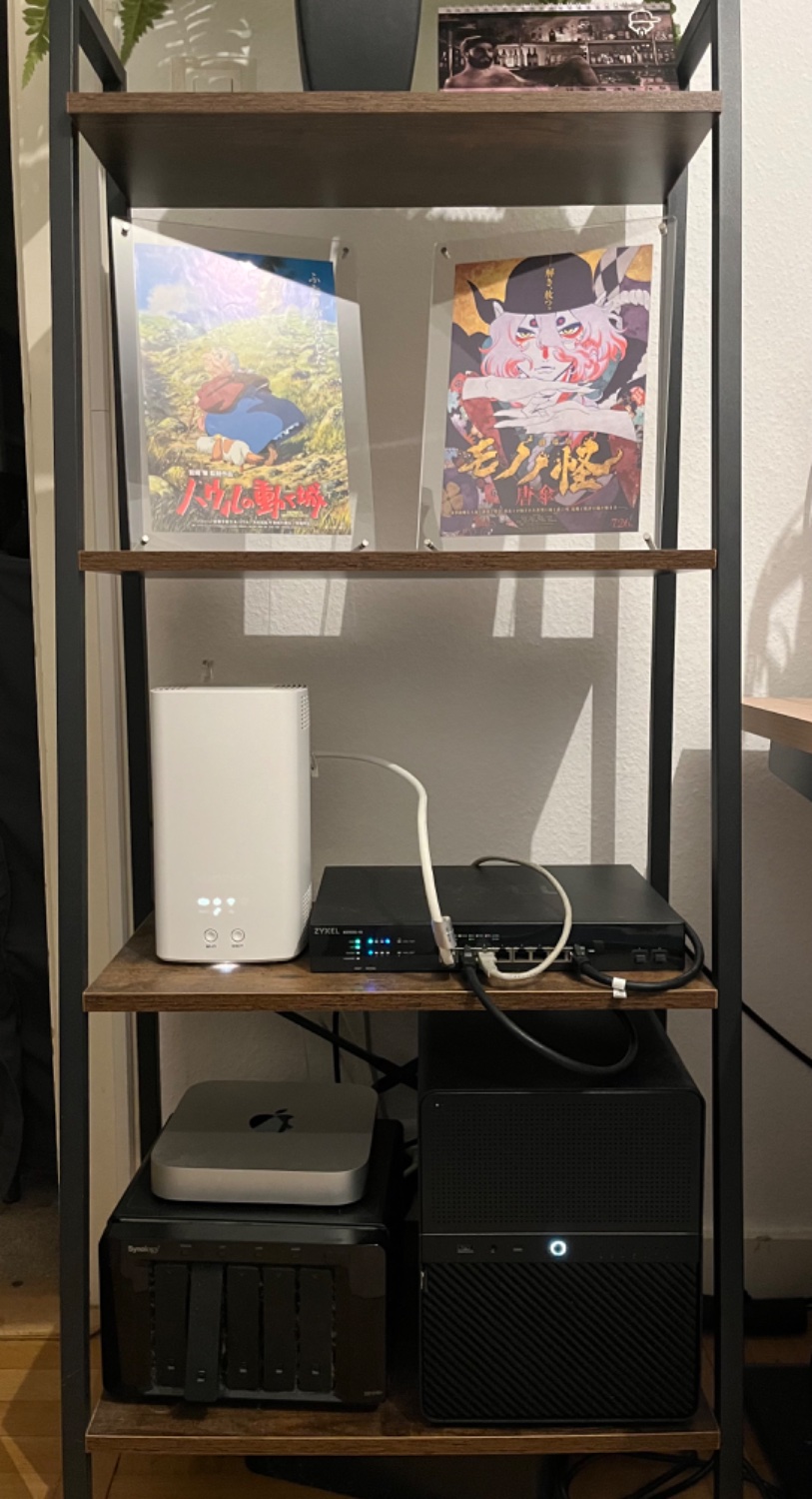
A simple homemade NAS, mostly for hosting my Plex library, VPN+torrent and cloud.
The synology needs to be emptied, removed and sold.
The m2 Mac mini was hosting some docker like pihole and actual budget but those are now on another Mac mini used as a workstation, so this one will be sold as well.
How’s your experience with actual budget been? I’ve been considering it and am currently using YNAB.
I made the switch from YNAB cause [email protected]
I only had a small understanding problem at the beginning but then I quickly managed to replicate my YNAB (and import the data).
Now that I’m used to it I don’t see any problems and I like it. I believe you can try it locally without running the server version.
The lack of mobile app could be a downside but I don’t budget on my phone.
Okay, thank you. A lack of a mobile app isn’t a big deal as I don’t really use the YNAB mobile app to begin with since the browser version works so much better on a computer.
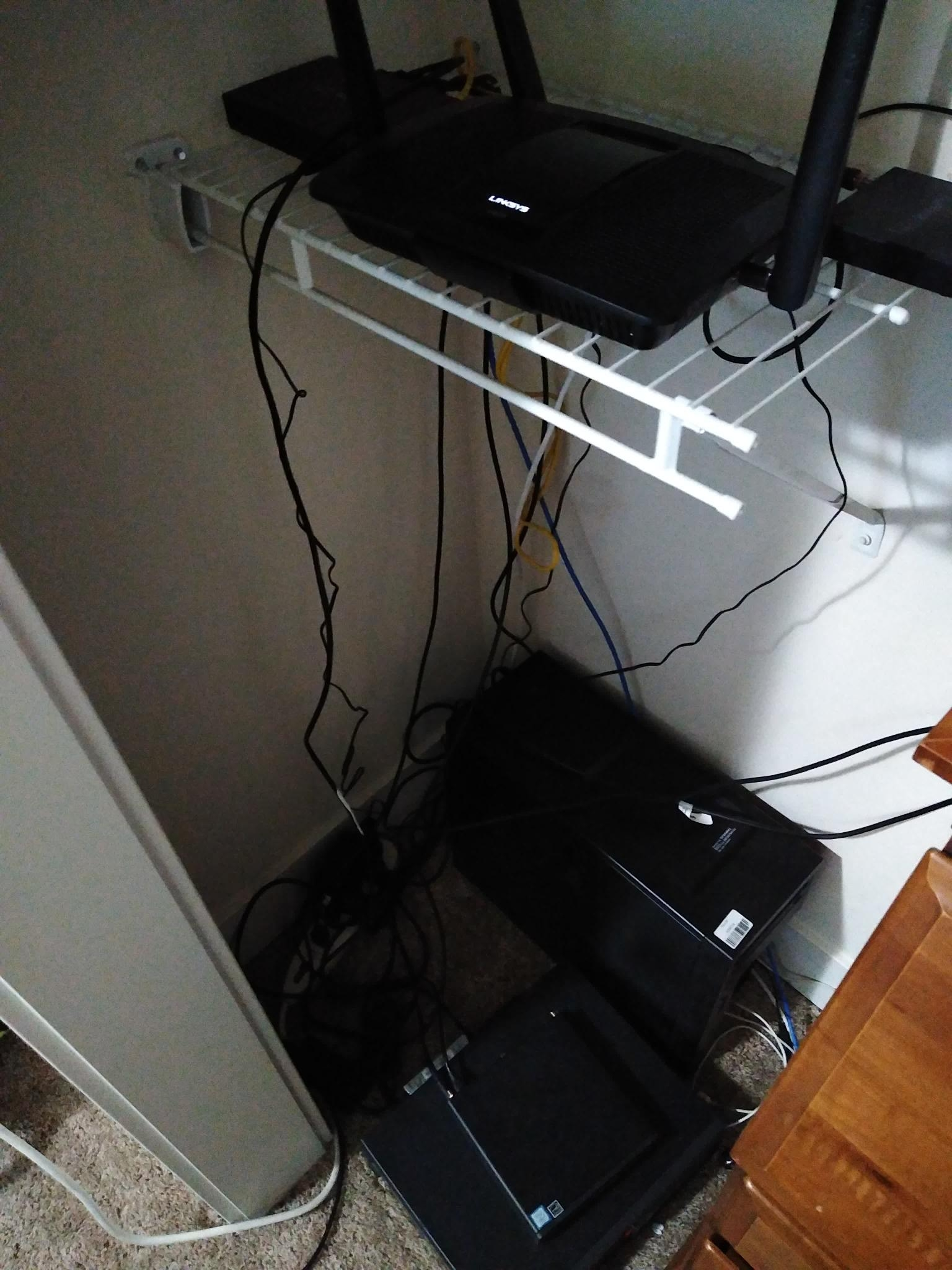
What are those machines on the floor?
The meat and potato’s of my homelab. It is just a Proxmox cluster hosting some things.
Most of it is pretty ordinary as I just have a bunch of Debian VMs hosting docker compose. Ansible for deployments and I am working on moving completely to NFS for storage.
The two notable things I have is a virtualized NAS running TrueNAS and a virtualized desktop running Linux Mint. The NAS has a pcie sata controller passed though with two SSDs and the desktop has a RX580 and the USB controller passed though. The tower seen in the back has both of those currently and what you can’t see is my monitor, keyboard and mouse.
Here are the services I’m running:
-
Jellyfin
-
For movies and live TV
-
Nextcloud
-
my files and the Nextcloud suite
-
Matrix
-
not really used much
-
my website (it is not much at the moment)
-
I’m using busybox http
-
Graphana and Influxdb
-
monitoring. I will eventually move to something else.
The hardware is the follows:
-
Dell precision tower with a i7-6700k and a standard ATX power supply
-
Lenovo think center with a i5-8500
-
HP whatever its called with a i5-8500
Also the router and my AP (not in picture) is running OpenWRT with vlans
what are you replacing grafana with?
-
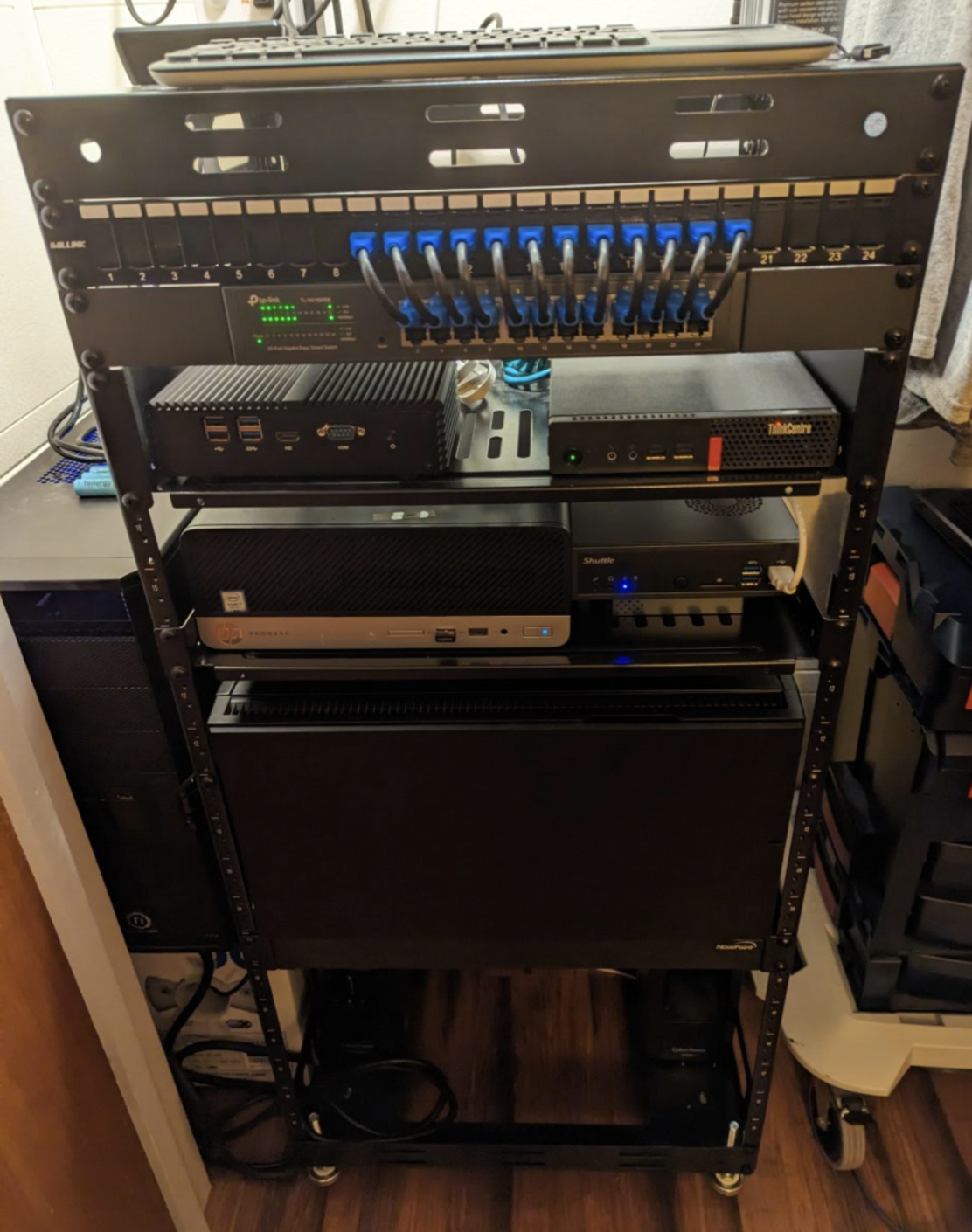 From top to bottom:
From top to bottom:- Patch panel (with artisinal, handmade cables)
- TP-Link managed switch Shelf 1:
- PFSense 4 port firewall
- Lenovo m910q w/Proxmox (cluster node 1) running 2 VMs for docker hosting: Ubuntu for media stuff (arrs, navidrome, jellyfin, calibre, calibre-web, tubesync, syncthing) and Debian for other stuff (paperless-ngx, vikunja, vscodium, redlib, x-pipe webtop, fasten health, linkwarden, alexandrite), 1 Win 10 VM for the very few times I need to use windows, some Red Hat Academy student and instructor RHEL 9 VMs, and an OPNsense VM for testing Shelf 2:
- HP Elitedesk G5 800 SFF w/Proxmox (cluster node 2) with an Nvidia GT 730 passed through to a Debian VM used primarily as a remote desktop via ThinLinc, but also runs a few docker containers (stirling pdf, willow application server, fileflows)
- Shuttle DH110 w/Proxmox (cluster node 3) with 1 VM running Home Assistant OS with an NVME Coral TPU passed through as well as a zooz 800 long range zwave coordinator (the zigbee coordinator is ethernet and in a different room) and two LXCs with grafana and prometheus courtesy of tteck (RIP) Shelf 3:
- WIP Fractal R5 server to replace the ancient Ubuntu file server to the left (outside the rack, sitting on the box of ethernet cable) that is primarily the home of my media drives (3 12 TB Ironwolf drives) and was my first homelab server. The new box will have a Tesla p4 and RX 580 GTX, i7-8700T and 64GB RAM in addition to the drives from the old server. I’ll be converting the Ubuntu drive from the old server into an image and will use it to create a Proxmox VM on the new server, with the same drives passed through. Bottom:
- 2 Cyberpower CP1000 UPS with upgraded LiFePO4 batteries. The one on the left is only for servers and only exists to give the servers time to shut down cleanly when the power goes out. The one on the right is only for network devices (firewall, switch and the Ruckus R500 out of shot mounted higher in the closet)













